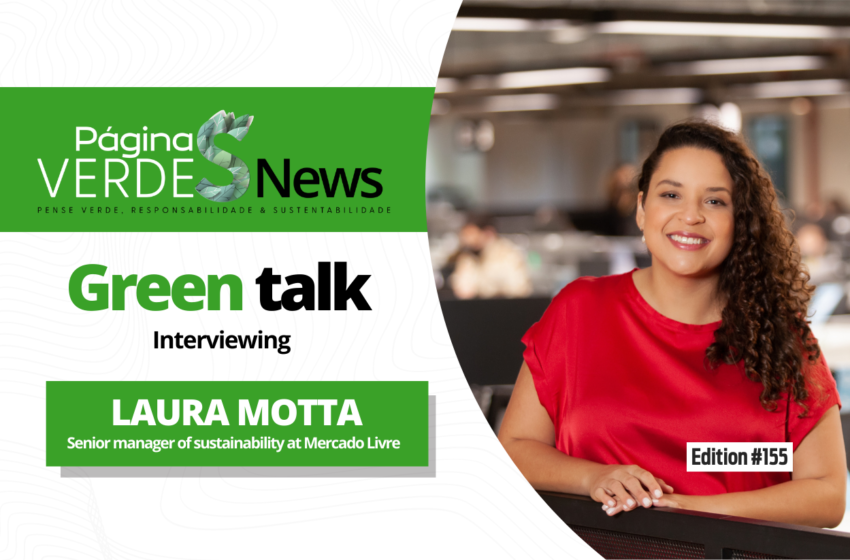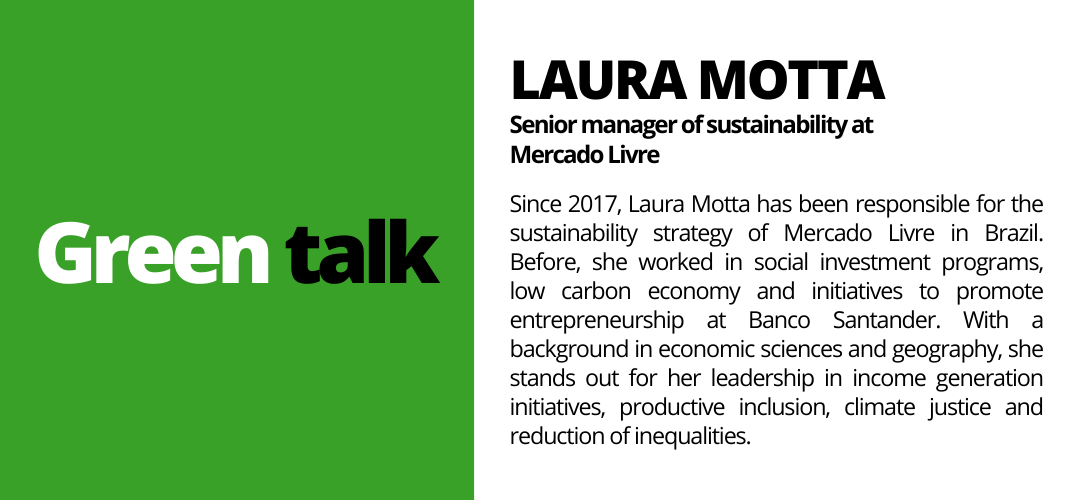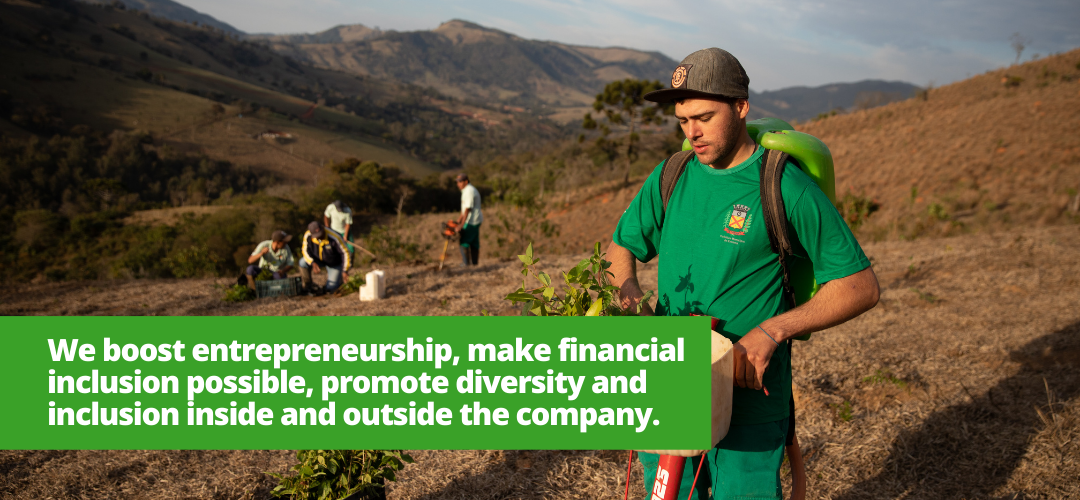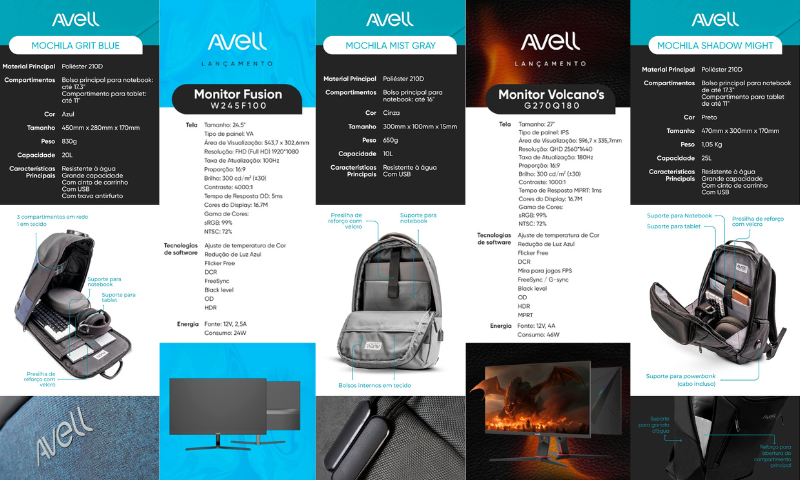
Green Pages:
MERCADO LIVRE: COMMITMENT TO SUSTAINABILITY AND POSITIVE IMPACT
ESG in its DNA
by Stephanie Kohn
One of the main e-commerce players in Latin America, Mercado Livre stands out in its business strategy and decision-making that promote a positive impact on society and the environment. In the environmental area, it seeks to reduce its carbon emissions by adhering to Science Based Targets (SBTi) and developing climate action targets. It invests in energy and material management, sustainable mobility, regeneration and conservation of biomes. In the social aspect, it promotes inclusion and diversity. Internally, it values diversity in teams. The engagement of suppliers and partners is a priority. Implemented a sustainable procurement program, ensuring ESG criteria are considered before any commercial transaction.
Corporate governance is another important front. Across. practices focused on business ethics, transparency, accountability, cyber security and data privacy, the company protects the interests of its shareholders and promotes an ecosystem of entrepreneurship. To monitor and report its performance in relation to the ESG criteria, it annually prepares the Positive Impact Report. Based on international standards, it reflects the social, environmental and economic results of Mercado Livre. In addition, it reports on other initiatives, such as raising US$ 400 million for triple impact projects in Latin America. See the full interview.

PÁGINAS VERDES – What are Mercado Livre’s main goals and commitments in relation to ESG (environmental, social and governance)?
LAURA MOTTA – We are committed to the environmental, social and governance agendas. As our business advances, we have sought guidance on which paths to follow. In this sense, we have evaluated and assumed several commitments. In 2022, for example, we started developing climate action targets to reduce our carbon emissions, following the Science Based Targets (SBTi) methodology. In addition, we recently joined the UN Global Pact in Brazil and have been in constant contact with specialists to understand how we can advance further in the design of goals. Amidst all this, we are focused on what we can do today to generate a positive impact in the medium and long term, developing and advancing our strategy to have the lowest environmental impact in the shortest possible time.
PV – How is Mercado Livre integrating ESG criteria into its business strategy and decision-making?
LM – We work to monitor and multiply our impact along our entire value chain. This strategy is transversal to the business and is aligned at all levels of the company, unfolding in actions on three main fronts. In the social area, we boost entrepreneurship, make financial inclusion possible, promote diversity and inclusion inside and outside the company, democratize opportunities through education. On the environmental front, we combine impact reduction actions, such as energy management, clean mobility, and circularity, with investments in conservation and regeneration of biomes. In the area of governance, we invest in transparency and accountability in products and services, as well as in cybersecurity and data privacy.
PV – What are the environmental management practices adopted by the company to minimize its environmental impact and promote sustainability?
BG – We are aware that as our business grows and connects more people, so does our environmental impact and responsibility. Therefore, we have created an environmental management strategy focused on measuring, mitigating, and reducing carbon emissions, while increasing our positive impact. Our environmental impact strategy is based on four fronts, and one of them is sustainable mobility. We currently have more than 1,000 electric vehicles in our logistics, which is already the largest sustainable fleet in Latin America. In Brazil alone, we operate 700 vehicles, double the volume of 2022. And this increase was accompanied by the installation of more than 200 charging points for electric vehicles in Brazil, Chile, and Mexico, based on an investment of US$ 800,000. Our fleet is also made up of vehicular natural gas (CNG) vehicles. Today, there are almost 140 trucks that use natural gas in Brazil alone. Another front is energy management. In 2022, we migrated 10 sites, eight of them in Brazil, to 100% renewable energy. Material management also encompasses one of the fronts. One hundred percent of our packaging is recyclable, reusable, or compostable. Allied to this, last year we launched a project that eliminates secondary packaging for industrial products, in which we replace paper boxes and plastic envelopes with a single label, affixed directly to the original merchandise box. Another point we work to mitigate the environmental impact is the regeneration and conservation of biomes. We decided to focus our efforts on projects that help protect Latin America’s biodiversity and the valuable ecosystem services it offers and that, in the future, could generate new carbon credits. For this, we have the Regenera América program (Regenerate America Program). With this initiative, which we launched in 2021, we already have more than 6,000 hectares being restored, 10 million native trees restored and the potential to capture 900,000 tons of CO2 over the next 25 years.

PV – What are Mercado Livre’s social initiatives to promote inclusion and diversity, both within the company and in the communities where it operates?
LM – Our work to value and promote diversity, equity, and inclusion, which unfolds in internal actions, partnerships, and campaigns, has proven to be an efficient way to raise awareness, bring people closer together and engage people in the causes in which we believe. And this has happened naturally, looking at our business, internal practices, and our culture, which demands diversity as a way of representing and understanding the needs of our users. Based on our social activities, we work to promote progress in the communities where we operate, and this is done through different programs that are also managed in terms of sustainability. Professional education and training programs carried out in all regions, accelerated this process, and brought even more diversity to the teams. Among them are: First Mile, a development program for black people at the beginning of their careers, in the logistics area; the IT Bootcamp, which is an exclusive program for people with disabilities in the technology area; Conectadas (Connected), which trains girls aged 14 to 18 in digital skills; o Redes para o Futuro (Networks for the Future), aimed at training and employing young people in the communities where we operate. Conectadas, for example, reached more than 1,300 girls in Latin America in 2022.

Redes para o Futuro, another project managed by the sustainability area, allowed 36% of young participants to have their first formal job with us. We also carried out Agora Vai, Mulher (Now Go, Woman), which promotes financial education for women entrepreneurs, impacting more than 2,300 women in Latin America since its launch last year. Looking inward, we act so that the teams reflect the diversity of our millions of users in Brazil and Latin America, allowing us to offer experiences that are closer to the expectations of different consumers. Diversity and inclusion are values, bring competitive advantage and are drivers of innovation. For this reason, we work to always be above market indicators for each type of diversity that we currently focus on. We do not carry out affirmative actions, but intentional ones, when we act to change the diversity of our internal population and, above all, to hire, promote and develop our leadership in an inclusive way. Currently, the female audience represents 49% of more than 18,000 employees in Brazil, occupying 39% of leadership positions and 37% of senior leadership. In addition, we have tripled our black population in recent years, reaching 45% of the staff, 20% in leadership positions and 10% in senior leadership. In the last voluntary census, we carried out, in 2021, more than 12% of Mercado Livre employees in Latin America declared themselves to be part of the LGBTQI+ community. In addition to a diversity, equity, and inclusion area, with its own team and budgets, we have affinity groups and a committee to accelerate this journey.
PV – How is Mercado Livre engaging its suppliers and partners to ensure they are also aligned with ESG principles?
LM – Our ESG initiatives are driven by shared governance, thus ensuring that this agenda is transversal to the different areas of the company, and this applies to our partners and suppliers. Associated with this, we now have a sustainable purchasing program, which guarantees the evaluation of essential criteria for us, before any transaction with commercial partners.
PV – What are the corporate governance mechanisms implemented by the company to ensure transparency, accountability and protection of the interests of its shareholders?
LM – Through governance, we work for an entrepreneurial ecosystem, investing in transparency and accountability in products and services based on the direct involvement of leadership, from the executive committee to other committees, applying our practices focused on business ethics and policies of conduct, and ensuring the cybersecurity and data privacy that are at the heart of our business. We have a risk and compliance area, which is responsible for the governance of the company’s code of ethics, as well as for the management of policies, procedures, and controls throughout our ecosystem. This area stands out for its focus on internal and external customers seeking to simplify processes and add value to our business. The team that integrates it is specialized and focused on the areas of operational and reputational risks, investigations, and regulations in all countries in which Mercado Livre operates.
PV – Tell us about the indicators and metrics used by Mercado Livre to monitor and report its performance against the ESG criteria.
LM – Annually, we prepare and publicly disclose our Positive Impact Report, in which we gather the main projects and ,social-environmental-economic results of the previous year. It is prepared in accordance with the new standards of the Global Reporting Initiative (GRI) 2021, the guidelines of the Sustainability Accounting Standards Board (SASB), for the e-commerce sector, and the Marco Internacional de Reporte Integrado (International Integrated Reporting Framework), which consolidates the financial information present in the report. Conducted under the highest international standards, the report referring to our 2022 actions, for example, was defined based on the opinion of the company’s stakeholders, chosen through a materiality survey in which more than 62 thousand people participated, among users, Mercado Livre’s work teams, suppliers, civil society organizations and representatives of the public and private sectors throughout Latin America. In addition, we report on our work on other fronts of this agenda, such as the US$400 million sustainable bond, which was raised in 2021 to boost triple impact projects in Latin America.
PV – What are the tangible results and impacts that Mercado Livre has already achieved through its ESG initiatives and commitments?
LM – Looking at our positive impact generated in 2022 alone, we delivered more than 4.6 million packages with sustainable modes, we sold more than 11 million products with a positive impact, we carried out more than 5.2 million credit operations to small entrepreneurs, we invested in the restoration of more than 10 million native trees, facilitated market access for more than 500,000 micro and small companies and promoted financial education for more than 7,000 young people and entrepreneurs. Our solutions have a unique multiplier effect and the potential to transform people’s lives. We have the challenge of making it a reality, with concrete and tangible results. Our ecosystem is the starting point of this commitment: we place technology in favor of the communities where we operate and the causes in which we believe.

Source: Eletrolar News – Ed#155





